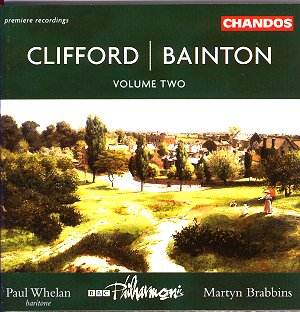The orchestral Scherzo Epithalamion after
Spenser, completed in 1929, is very much the product of its time. It
is also – and most importantly, I think – a splendid piece of music
that should have firmly placed its composer on the British musical map
along with, say, Bax and Bridge. This superbly crafted work displays
a remarkable orchestral mastery made clear in the very first bars of
the scherzando introduction. This is sustained, almost effortlessly,
throughout alongside a not inconsiderable melodic gift. This gift is
evident from the marvellous theme on trumpets and horns heard immediately
after the scurrying introduction. This is the kind of thing that Bax
and Bridge could have written (e.g. the latter’s rhapsody Enter
Spring). Bainton’s Second Symphony (on Chandos CHAN 9757) is
a full-blooded Romantic utterance of some considerable substance, though
fairly traditional in its aims and means. In Epithalamion,
Bainton demonstrates that he was not hostile to Impressionism either,
for here is music of great melodic and harmonic refinement. This is
by far the finest work in this release and one may keep wondering how
on earth such music as this has remained unheard for so many long years.
An English Idyll was composed several years after the
completion of the Second Symphony when the composer was still living
n Australia. The former critic of the Manchester Guardian, Sir
Neville Cardus, spent the war years in Australia, and he too must have
felt some nostalgia for England. He wrote these poems (apparently the
only ones he ever wrote) to be set by Bainton who most likely shared
the same feelings. The resulting piece is a perfect example of what
a gifted composer can do with words of little literary distinction.
Cardus’s words, as far as I am concerned, are a bit too much of the
Ye Olde England sort of thing and rather dated. Bainton, however,
clothes them with some really fine, beautifully nostalgic music although
he falters in the attempted evocation of the bustle around Piccadilly
Circus. He nevertheless finds the right notes for the beautiful third
section Cathedral in which he quotes the plainchant hymn Vexilla
regis to great effect. A most welcome rarity, though, well worth
more than the occasional hearing.
Clifford’s powerfully impressive Symphony 1940
(also on Chandos CHAN 9757) gives ample proof of the composer’s symphonic
potential and establishes his credentials as a ‘serious’ composer. In
many respects, Clifford’s career is not unlike that of Arthur Benjamin,
a most distinguished composer, whose reputation nevertheless (and somewhat
regrettably) rested on lighter works such as the ubiquitous and popular
Jamaican Rumba, Cotillon Suite or North
American Square Dance Suite. But he too wrote a substantial
symphony towards the end of World War II, several worthy operas and
some more serious orchestral works such as his beautiful Ballade
for strings. Clifford also composed some lighter works such as the colourful
A Kentish Suite (film music without the film, dixit
Lewis Foreman) or the exquisite Five English Nursery Tunes.
Superior light music of great charm and superbly scored, to be enjoyed
for all it is worth. The short Casanova Melody (edited
by Rodney Newton) is a trifle from the additional music composed for
Carol Reed’s celebrated film The Third Man. On the other
hand, the miniature tone poem Shanagolden inspired by
a trip to Ireland and the place where his grandmother died may call
Moeran to mind but is a real gem.
Martyn Brabbins conducts committed readings of these
unjustly neglected works that should appeal to anyone wanting to explore
some of the forgotten byways of the British Musical Renaissance. Warm,
natural recorded sound and excellent notes by Lewis Foreman. I for one
hope that we shall not have to wait too long for Volume 3.
Hubert Culot
See also review
by Rob Barnett
